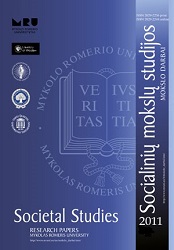Le changement du sens des notions d’être, d’éternité et de temps dans la scolastique moderne
Transformation of the Meanings of the Concepts of Being, Eternity and Time in Modern Scholasticism
Author(s): Povilas AleksandravičiusSubject(s): Metaphysics, Early Modern Philosophy, Philosophy of Religion, Hermeneutics, Ontology
Published by: Mykolas Romeris University
Keywords: being; eternity; time; modern scholasticism; cause; God; ratio; Thomas Aquinas;
Summary/Abstract: At the core of Thomas Aquinas metaphysics of being lies the actual divide between the act of being (actus essendi) and the essence of every living being. This context of metaphysics alone allows the understanding of the meanings of eternity and time as used by Thomas Aquinas. Duns Scotus understands being in a different way, he provides the concept of univocity of being, in other words, the meaning of being does not change with regard of its affiliation to the God or to the created living being. In this way, supposedly, the rational mind of man can, in effect, attain the God:in the same way as we gain comprehension of any living being, so we are granted the ability to comprehend the God on the condition that our minds are sufficiently deep. Thomas Aquinas proposition about the underlying inability of human rationality to attain the God is erased from this approach. As early as the 15th century the followers of Thomas Aquinas forgot or openly critisised their educator‘s proposed reality of the divide between the act of being and the essence of being, and showed tendencies to accept Duns Scotus’ concept of the univocity of being. In this way the comprehension of being, and even that of the God, has become limited to the rules of human ratio,i.e. the rationalising of the comprehension of being has taken place. The law of causality, which Thomas Aquinas held applicable only to the domain of the created beings, modern scholastics introduced to the domain of the Divine being, as though the God could be comprehended as the ultimate cause and measured by the identical meaning of the cause concept, which is professed in the created world. The God is turned into Causa sui; a phantom concept, broadly spread among modern scholastics, but entirely foreign to Thomas Aquinas. The very modern scholasticism here, in a manner of speaking, converges with the general post Cartesian European metaphysics, particularly with its Leibnitz version. Eternity gains the understanding of a rationally interpreted concept of immobility, i.e. creating logical opposition to mobility and by abstracting from all features of mobility to produce a pure idea of immobility – eternity. The Thomas Aquinas’ concept of eternity here is forgotten or intentionally relocated to the field of theology, clearly separate from philosophical thinking. The concept of time, in its own turn, is devoid of its onthological weight, which it used to show in Thomas Aquinas’ texts. Now time is no more a measure of onthological passing of the created being, but an inconsiquential measure of physical movement. Hence stem endless and sterile disputes about the „subjectivity“ and „objectivity“ of time, disputes alien to Thomas Aquinas. The article concludes, that scholastics discussed in the article, despite their ambitions to pass as official interpreters of Thomas Aquinas, distorted the meaning of his texts. More, they became shareholders of the overall Western post Cartesian methaphysics, irrespective of their declarative struggle with the outcomes of this metaphysics (particularly in the area of morales). The assumption that thinking is a mere technique, as well as the whole world, and the God is mere technician, makes it pointless to fight the consequences of technology: it is senseless to destroy something what you are producing yourself continuously. The article ends in discussion about the meaning of philosophy in Thomas Aquinas works and its relevance for the modern world.
Journal: Socialinių mokslų studijos
- Issue Year: 3/2011
- Issue No: 1
- Page Range: 17-29
- Page Count: 13
- Language: French

